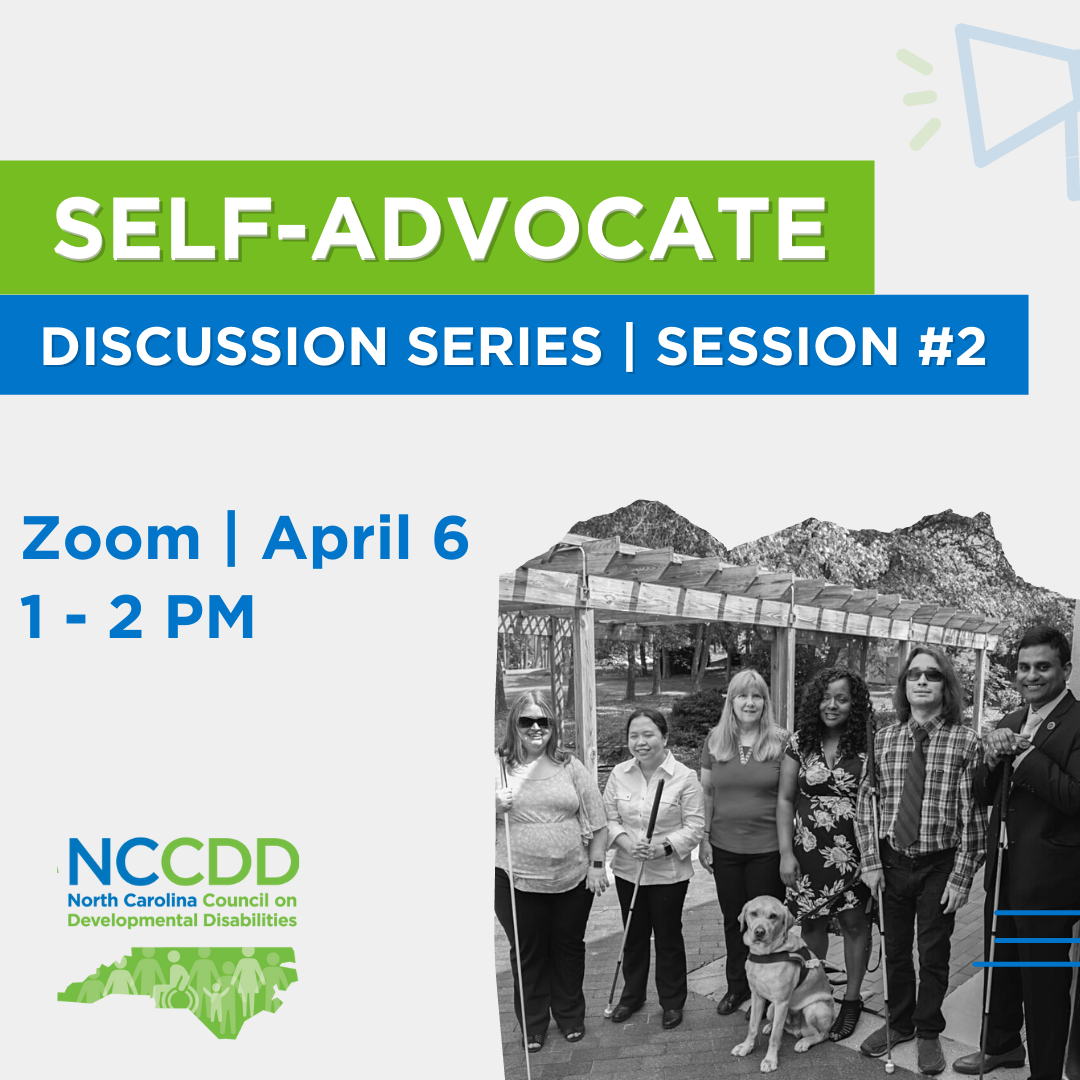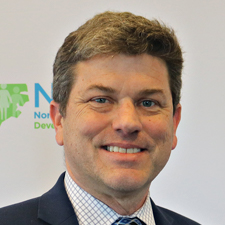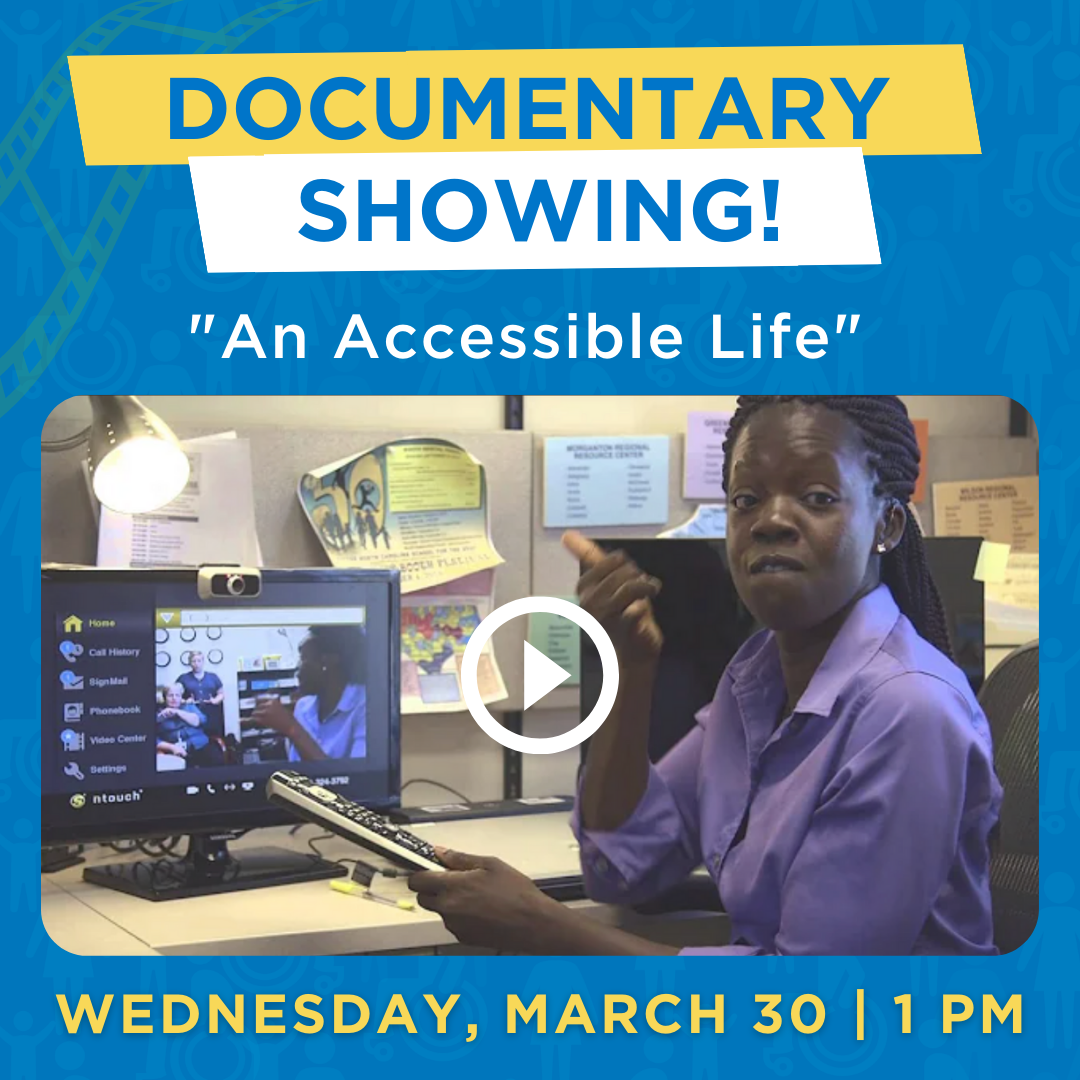March 2022 Highlights and Hot Topics
Letter from the Executive Director
March is Developmental Disabilities Awareness Month. This is a great opportunity to make sure people in your community know more about developmental disabilities (DD). This might include your religious community, your work, your school, or your neighbors. March is not the only time for raising awareness. The other 11 months in the year are also great times to do this.
There are lots of ways to raise awareness. These include: (1) posting on social media, (2) sharing a story in a newsletter for a school, church, or workplace; (3) making sure leaders and organizations know about DD Awareness and providing them materials for celebrating it; and (4) hosting an event.
NCCDD created some great new videos on DD Awareness. Here are some other terrific videos from our archives involving people with DD living across North Carolina from the Supported Living: Making the Difference initiative.
The Council’s initiative on the Registry of Unmet Needs has hit the ground running. LAND has launched the “Where are we now? Understanding NC's Innovations Waiver Waiting List”. It’s also available in Spanish.
Also, please join and tell people about our self-advocacy discussion series that takes place the first Wednesday of each month over Zoom.
Now is also a critical time to discuss the issues impacting the I/DD community. Two critical issues are the Direct Support Professional workforce crisis and the long waiting list for DD services (the Registry of Unmet Needs).
- This is a recent article on the Direct Support Professional crisis.
- Here is the state’s current Olmstead Plan.
- Here is important information on the state’s DD waiting list provided by the NC Waiver Action Team.
- Here is where we post our public policy updates.
We say it each month, but now is a critical time for the I/DD community. Let’s continue to raise awareness!
Talley Wells, Executive Director
Public Policy (as of March 9, 2022)

STATE
Legislative
The Joint Legislative Oversight Committee on Health and Human Services met on February 15. The agenda included updates on COVID from Secretary Kody Kinsley (Department of Health and Human Services) and a presentation from Director Deepa Avula (Division of Mental Health, Developmental Disabilities and Substance Abuse Services) on Behavioral Health Services. Another meeting is scheduled for March 15.
The Joint Legislative Oversight Committee on Access to Healthcare and Medicaid Expansion met on February 18 and March 1. The first meeting focused on rural hospitals and the nursing shortage in North Carolina. The March meeting focused on Medicaid expansion and included a presentation by the National Academy for State Health Plans. This presentation covered facts about expansion and the potential benefits. NC is one of only 12 states that has not expanded Medicaid and has the sixth highest uninsured rate in the United States. Expansion has been shown to improve health outcomes and increase coverage for mental health and substance use treatment. This could save dollars that could potentially be used to increase services for people with intellectual and other developmental disabilities (I/DD). Another meeting is scheduled for March 15.
The North Carolina Council on Developmental Disabilities (NCCDD) will continue to follow the work of these committees.
1915(i) Home and Community Based Services
The state continues to work on the service definitions for the 1915(i) Medicaid waiver. These services would create more options for people with developmental disabilities who are Medicaid eligible. The state’s goal for these services is that they will 1) take the place of the current (b)(3) services and 2) improve the service array for people with developmental disabilities. Key information about 1915(i) services:
- ‘i’ services are an entitlement for people who are eligible. So if someone meets the eligibility, they cannot be turned away or put on a waitlist.
- ‘i’ services will have limits on types of services and limits on hours.
- A person has to be Medicaid eligible due to income or SSI eligibility to receive (i) services.
- Individual does not have to meet institutional level of care (as with the Innovations Waiver).
The services that will be included under the (i) waiver include:
- Community Transition – services to help someone transition from institutional care to community living.
- Respite – can be at home or in a facility; can be planned or unplanned.
- Community Living and Supports – services to help someone live in their own home, family home, or home with other natural supports; similar to Innovations and state-funded service.
- Supported Employment – services to support competitive, integrated employment; matches Innovations and state-funded definitions.
The 1915(i) option will increase opportunities for home and community-based services.
NCCDD will continue to monitor this effort and expect a period for public input before the 1915(i) plan is submitted to Centers for Medicare & Medicaid Services (CMS) for approval.
Tailored Plan Care Management
As we move toward implementation of the Tailored Plan in December 2022, work continues to establish Care Management Agencies (CMAs) to provide care management for people with I/DD. Care Management is a multidisciplinary care team that provides whole-person care management that addresses: physical health, behavioral health, I/DD, traumatic brain injuries (TBI), pharmacy, long-term services and supports (LTSS), and unmet health-related resource needs. NCCDD along with other I/DD advocacy groups have pushed to include family navigation and peer support as a part of the care team. As a result, a definition of an ‘extender’ has been added to Care Management. An extender can be:
- Person with lived experience
- Certified Peer Support Specialist
- Parent/Guardian with 2 years experience
- Anyone with 2 years experience in ‘extender functions’
This is a positive step. Extenders are not required but encouraged to be included on the team. Rates do not fully cover costs of extenders, so Care Management Agencies (CMAs) may need to reduce use of CMs to offset costs. Despite these potential barriers, many providers have expressed interest in using extenders and have joined in advocating for their inclusion.
FEDERAL
State of the Union Address Includes Commitment to HCBS
On March 1, President Biden delivered his State of the Union Address in which he outlined his plans for a budget reconciliation package. President Biden referred to several parts of the Build Back Better proposal. In addition to highlighting the need to reduce the price of prescription drugs, the president also mentioned reducing costs of child care, providing universal pre-K for children ages 3 and 4, and providing long-term, in-home supports for older people and people with disabilities. This last point is referring to Medicaid home and community-based services.
Our continuing message to Congress is that we need a historic investment in home and community-based services to improve the quality of life for millions of people with disabilities, their families and the direct support professional workforce.
White House and Federal Agencies Outline New Actions to Keep People With Disabilities Safe During COVID
On February 24, the White House announced new actions to address the needs of people with disabilities during the COVID-19 pandemic and recovery. These actions include providing more guidance and supports to schools to keep students with disabilities safe, expanding the services provided by the Disability Information Access Line, making COVID-19 tests more accessible and distributing N95 masks to people with disabilities.
NCCDD Closes Out DD Awareness Month with “An Accessible Life”
This month, we’ve focused on community engagement as part of Developmental Disabilities Awareness Month (DDAM2022). Hopefully you’ve been able to enjoy our Scavenger Hunt, Write it Out (sending notes to community members), and Random Acts of Kindness in your community.It’s not too late to enjoy these activities! See our website for details here.
To end our DDAM2022 events, let’s gather to enjoy our documentary showing and discussion on Wednesday, March 30 at 1:00 p.m. We will gather on Zoom to view “An Accessible Life,” featuring NCCDD Chair Bryan Dooley and NCCDD Council Member Kay McMillan.
Stay around after the film ends to have a conversation with each other. Find details here.
LAND Survey Responses Due March 31
 LAND, a program of the Mental Health Transformation Alliance, has been awarded a four-year grant from NCCDD to develop and carry out a coordinated approach to positively impact the Medicaid Innovations Waiver waiting list in North Carolina.
LAND, a program of the Mental Health Transformation Alliance, has been awarded a four-year grant from NCCDD to develop and carry out a coordinated approach to positively impact the Medicaid Innovations Waiver waiting list in North Carolina.
It has launched an “Where are we now? Understanding NC's Innovations Waiver Waiting List” survey to understand the present status of the Innovations Waiver waitlist; the knowledge of it in the community; and how it impacts individuals with intellectual and other developmental disabilities, their families, caregivers and other stakeholders.
The deadline for completing the survey is March 31, 2022.
Currently, there are approximately 15,000 people on the Innovations Waiver waitlist in North Carolina, and that wait can be up to 12 years or more for many individuals in our state needing assistance with programs and services. Those 12 years are way above the average of the two-year wait in many other states in the U.S. The Innovations Waiver waitlist is also known as the Registry of Unmet Needs, RUN, Medicaid waitlist or the waiting list.
Complete the survey by March 31, 2022.
All participants will be entered to receive one of nine $50 Amazon gift cards! The recipient must be an individual with I/DD or a family member. LAND will choose three winners per region.
NCCDD’s Self Advocacy Series - April Session
 The North Carolina Council on Developmental Disabilities (NCCDD) will host its second session of the virtual monthly Self-Advocate Discussion Series on April 6 from 1:00 to 2:00 p.m.
The North Carolina Council on Developmental Disabilities (NCCDD) will host its second session of the virtual monthly Self-Advocate Discussion Series on April 6 from 1:00 to 2:00 p.m.
Spend time with others who have common interests, develop your personal story to be goal and topic-oriented, and become part of the NCCDD community!
Discussions aim to emphasize the value of people with disabilities to build and maintain relationships with North Carolina legislators and decision-makers while bridging relationships and a network among North Carolina self-advocates. Join us!
Audio - Highlights and Hot Topics



